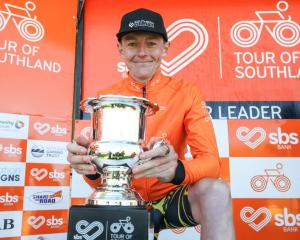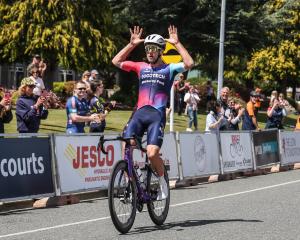
You know you have given it plenty when the corrective surgery involves cutting into your stomach.
Elyse Fraser went through that operation twice.
Iliac artery endofibrosis does not sound like a lot of fun, so let’s start somewhere else - before her guts got sliced open.
In May 2017, Fraser (now 34) was at the start of her journey in some ways.
The Dunedin cyclist had taken a year out from her police work to chase her dreams.
She had been selected in the New Zealand track team that was heading to the United States for a month or two of racing and training.
Her focus was fixed on making the pursuit team for the 2018 Commonwealth Games, and the even bigger dream was to ride for her country at the Tokyo Olympics.

Fraser, who had moved to Christchurch for work by then, went shopping for a new one and snapped herself up what she described as an excellent package deal — a boyfriend, a coach and a new bike.
The new bike came separately. The coach and boyfriend was just the one bloke — Andrew Williams.
He convinced her to try competing on the track and, under his guidance, she made steady progress.
That work paid off with her selection in the New Zealand squad.
"It was a really interesting time in the New Zealand squad. It did not all go to plan," Fraser said.
Injury and illness threw up a few barriers, as you expect in sport. But the culture of the women’s programme had become "dysfunctional".
That is what a review into the sport found in 2018.
"I don’t want to slam CNZ [Cycling New Zealand] because I know they’ve had a lot of bad press, but things have changed a lot since I was there and I was probably not looked after as well as possible," she said.
The year she spent trying to crack the pursuit team "was really tough".
"The culture in the women’s squad when I was there — there was not a lot of work being done on it and it was pretty poor.
"I came into the squad as an older athlete and so I knew myself really well and my body really well and what it needed, and that probably was not recognised by the coaching team at the time.
"It took a long time to heal from that. Getting into coaching was probably quite a good way to feel like I was doing my part to make things better."
Fraser spent 18 months with the New Zealand team then spent a year in Belgium with a road team.
In 2020, she needed the first of two rather gruesome operations.
After all that time in the saddle, she had developed iliac artery endofibrosis.
The fix involved a surgeon chopping out a vein from the lower leg and grafting it on to the damaged artery.
A couple of incisions — one in the leg and one in the stomach — were required.
The first operation was not successful, so Fraser had to have a second.

Between the two stints under the knife and the rehabilitation, Fraser had the space to develop her coaching. It felt like a natural transition for her.
She had been approached by promising road cyclist Amye Kellow to coach her when she first arrived back in New Zealand, and she also started coaching Amye’s sister, Georgia.
"When I first started training Amye, she was pretty unwell due to over-training and under-nourishment.
"That is what my passion is: getting people healthy and making sure they stay healthy by building really strong relationships and communication so they can strive on the bike.
"But you do need to be really tough as well. Sport is really hard, and at the top level it is pretty unforgiving. You do have to recognise that balance."
Fraser has 12 riders on her books now. She splits her time between coaching and her work with the police in the family protection team.
This year, she was contracted by Cycling New Zealand to lead the women’s team at the junior track world championships in Israel in August, which included training camps in Invercargill and Cambridge in the lead-up.
"I feel like I have lots to give. I learned so much about the sport when I was in it and I think it is a really nice way to give back and encourage the next generation.
"I get to focus on helping other people become awesome. I think I’m probably a much better coach than I was an athlete."
Her advice to young riders making their way is it is a "a long journey".
"They don’t need to be in a hurry to get to where they want to go. It is not just learning about being an athlete — it is about progressing as a person.
"The fun part is the most important. If you are not enjoying it, it’s going to be pretty tough, especially in road cycling.
"At the top level, you can go years without getting a result, so if you are not having fun, it is very difficult. It is a lot of hours on the bike by yourself."
The other major piece of advice is do not go all-in.

"I was really lucky I studied while I was an athlete and had a job behind me that I could go back to."
Fraser was part of the first review into Cycling New Zealand in 2018 and said it "was a bit disappointing that they did not take on board what was said".
But she believes the organisation is committed to real change following a second damning review this year. She described interim chief executive officer Monica Robbers, interim high performance director Amy Taylor and transformation director Kereyn Smith as "forces for change".
Her own coaching style has been to prioritise people over medals, and now that Cycling New Zealand is moving in that direction, they could use people like Fraser to help usher in change.
Fraser’s next step in her coaching journey is to work on her personal development. She has been invited to join Wish — a women in high performance programme — and will head to the United Kingdom in October for a course.
She is also part of the Te Hapaitanga programme. It is a holistic coach development initiative designed to enable more women to pursue and maintain careers in high performance coaching in New Zealand.
Fraser is also open to rejoining the New Zealand team, but this time as a coach who is committed to getting the best out of people by putting the athlete first.












